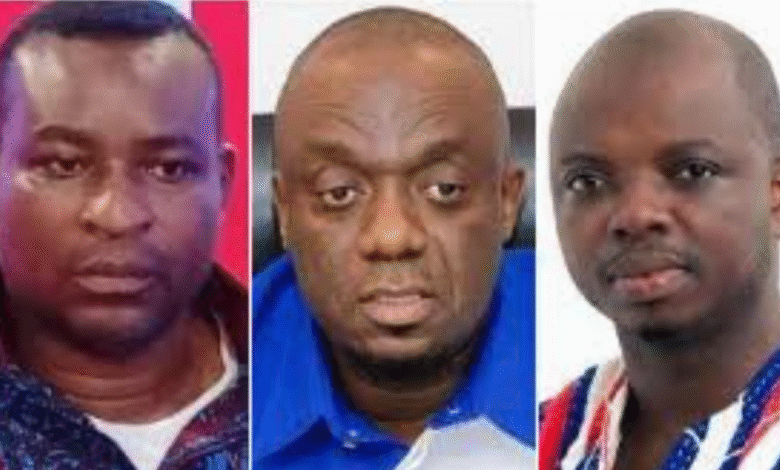NPP Rejects Regional Chairmen’s Claims on Primaries, Vows Fair Process for 2026 Flagbearer Race

The New Patriotic Party (NPP) has firmly distanced itself from controversial statements made by two of its prominent regional leaders, Ashanti Regional Chairman Bernard Antwi Boasiako (known as Wontumi) and Bono Regional Chairman Kwame Baffoe (alias Abronye DC), regarding the party’s upcoming presidential primaries.
In a strongly worded official statement issued on September 28, 2025, the NPP emphasized that these remarks do not reflect the party’s values, principles, or official stance, urging all members and the public to disregard them as misleading and potentially divisive.
The controversy erupted after Wontumi publicly suggested that the decision to schedule the presidential primaries for January 31, 2026, was strategically timed to benefit a specific aspirant in the race for the party’s flagbearer position ahead of the 2028 general elections. Similarly, Abronye DC boasted about his role in compiling the Bono Regional album—a key register of polling station executives eligible to vote in the primaries—and claimed he could exclude certain individuals from participating. These comments, made in separate public appearances, sparked concerns about potential bias and manipulation within the party’s internal electoral processes.
NPP General Secretary Justin Kodua Frimpong, who signed the statement on behalf of the national leadership, categorically rejected any notion of individual control over the primaries. “No individual, regardless of rank or position, has unilateral control over the compilation of polling station albums,” the statement declared, stressing that the entire process is governed by “strict compliance procedures” designed to ensure transparency and accountability.
Frimpong assured stakeholders that the National Secretariat would soon release detailed, clear guidelines to uphold the “integrity, credibility, and fairness” of the exercise, particularly in the compilation and verification of voter albums at the polling station level.
The party specifically called on polling station executives—the grassroots backbone of the NPP—to ignore the regional chairmen’s assertions, labeling them as personal opinions that could erode trust in the democratic process. This intervention comes at a sensitive time, as the NPP gears up for what is expected to be a highly competitive flagbearer contest. Five aspirants have already submitted their nomination forms, including high-profile figures like former Vice President Dr. Mahamudu Bawumia, former Assin Central MP Kennedy Agyapong, former Essikado-Ketan MP Joe Ghartey, and Abetifi MP Dr. Bryan Acheampong. Vetting of these candidates concluded earlier in September, setting the stage for what the party hopes will be a unified front heading into 2028.
Defending the choice of January 31, 2026, as the primaries date, the NPP explained that it was the result of “exhaustive deliberations” by the National Council, made “in the supreme interest of the party.” The early timing, the statement noted, is a deliberate strategy to give the eventual flagbearer ample opportunity to reorganize the party, reposition its messaging, and mount a robust campaign to “recapture power” in the 2028 elections after their defeat in 2024. This move underscores the NPP’s focus on long-term planning, allowing time to heal internal divisions and strengthen outreach in key regions like Ashanti and Bono, where Wontumi and Abronye hold sway.
The NPP’s response also reaffirms its broader commitment to “transparency, fairness, and internal democracy,” pledging that all electoral activities will adhere to the “highest standards of integrity.” Party insiders have pointed out that both Wontumi and Abronye have a history of making bold, sometimes inflammatory statements that have previously drawn scrutiny.
For instance, Abronye was referred to the NPP’s disciplinary committee in June 2025 for breaching party directives and making “unguarded public comments,” highlighting a pattern of needing to rein in vocal regional leaders to maintain discipline.
Abronye has even hinted at his own ambitions for the flagbearer role, further complicating perceptions of impartiality.
As the primaries approach, this episode serves as a reminder of the delicate balance the NPP must strike between regional autonomy and national cohesion. With the 2028 elections on the horizon, the party is keen to project an image of unity and fairness, especially in the face of opposition from the ruling National Democratic Congress (NDC).
The full statement from the NPP, available on the party’s official channels, calls for all members to rally behind the established processes and avoid actions that could undermine the collective goal of victory.
This development has already sparked discussions on social media and among political analysts, with many praising the NPP’s swift clarification as a step toward safeguarding the primaries’ legitimacy. For the Ashanti and Bono regions—traditional strongholds of the party—the message is clear: loyalty to the NPP’s democratic ideals must supersede personal or regional agendas.
As Ghana’s political landscape heats up, the eyes of supporters and observers alike will be on how the NPP navigates these internal tensions to emerge stronger for the battles ahead.







